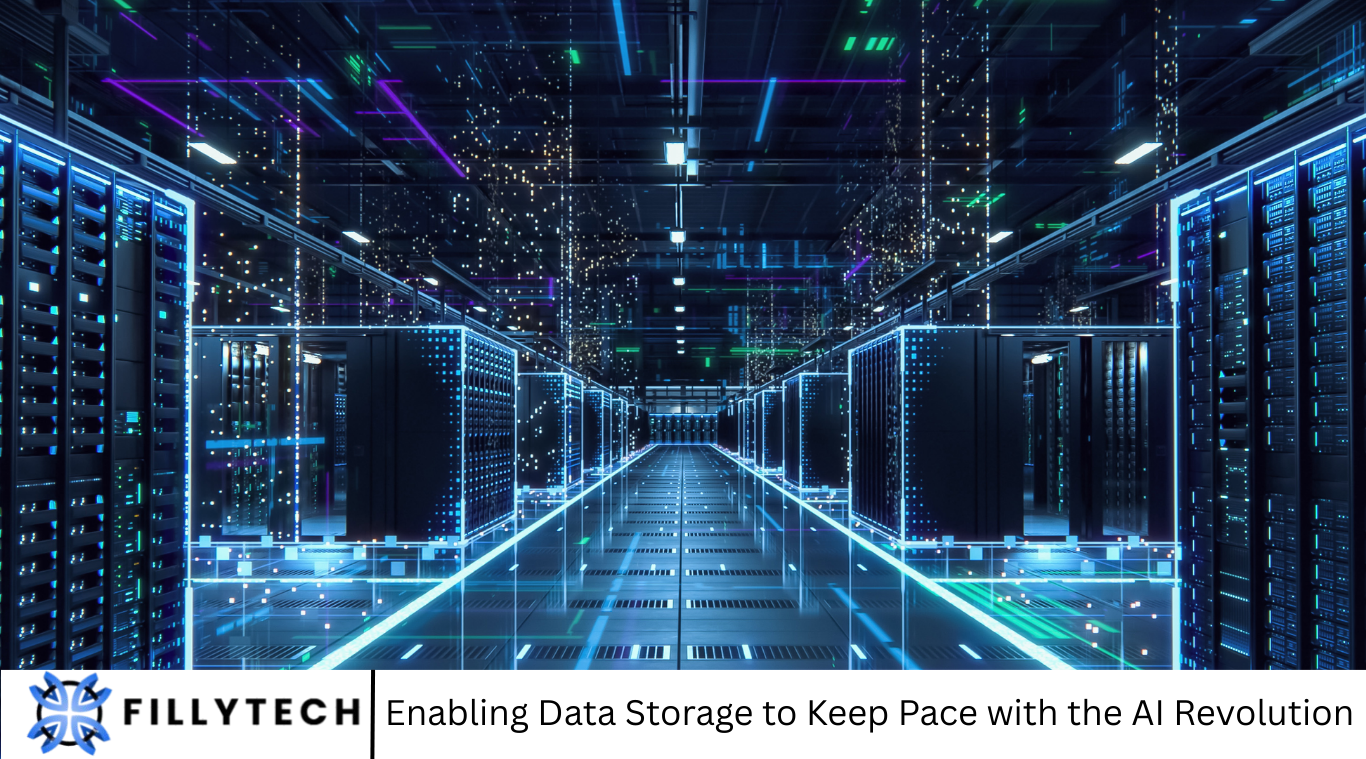Artificial Intelligence (AI) is transforming industries at an unprecedented pace, driving innovations from autonomous vehicles to personalized medicine and advanced robotics. At the heart of this revolution lies an often overlooked but critical component: data storage. The immense volumes of data generated, processed, and analyzed by AI systems require equally advanced and scalable storage solutions.
This article explores the challenges posed by the AI revolution on data storage infrastructure, the technological advancements enabling storage systems to keep pace, and the future outlook for data storage in AI-driven environments. Additionally, we will address frequently asked questions related to this dynamic intersection of AI and data storage.
The Growing Data Demands of AI
Explosion of Data Volumes
AI systems, especially those relying on machine learning (ML) and deep learning, require vast amounts of training data. This data is often unstructured—images, videos, text, sensor data—and must be stored efficiently for real-time or batch processing.
The global data sphere is expected to reach 175 zettabytes by 2025, driven largely by AI applications. Traditional storage architectures struggle to manage this exponential growth.
Data Velocity and Variety
AI not only demands capacity but also rapid data access and diverse data formats. High-velocity data streams from IoT devices, autonomous cars, and edge sensors require low-latency, high-throughput storage systems.
AI Model Complexity
Modern AI models are growing in size and complexity. Training models with billions of parameters requires high-speed storage for datasets and intermediate computations.
Challenges in Traditional Data Storage Systems
Scalability Limitations
Legacy storage architectures often lack the scalability required to manage petabytes or exabytes of AI data efficiently.
Latency and Throughput Bottlenecks
AI workloads demand quick access to large datasets. Traditional spinning hard drives (HDDs) and even some solid-state drives (SSDs) can struggle with the latency and throughput needed for real-time AI inference.
Data Management Complexity
Handling diverse data types—structured, unstructured, semi-structured—adds complexity. Ensuring data integrity, security, and compliance is also challenging.
Advancements in Storage Technologies Supporting AI
NVMe and SSDs
Non-Volatile Memory Express (NVMe) SSDs offer significantly lower latency and higher throughput compared to traditional SATA SSDs and HDDs, enabling faster data access critical for AI workloads.
Scale-Out Storage Architectures
Distributed storage systems allow data to be spread across multiple nodes, providing scalability and fault tolerance. Technologies like software-defined storage (SDS) enable flexible management of massive data pools.
AI-Optimized Storage Solutions
Some vendors offer storage platforms specifically designed for AI workloads, integrating high-performance hardware with software optimized for AI data patterns.
Edge Storage Solutions
With data generated at the edge (e.g., IoT devices), edge storage solutions provide localized data handling, reducing latency and bandwidth usage.
Data Storage Architectures for AI
Data Lakes and Data Warehouses
Centralized repositories where large volumes of raw data are stored and later processed for AI training and analytics.
Hybrid Cloud Storage
Combining on-premises and cloud storage offers flexibility, scalability, and cost efficiency. AI workflows often span multiple environments.
Object Storage Systems
Object storage is well-suited for unstructured data common in AI applications, providing scalability and metadata-rich management.
Role of Cloud in AI Data Storage
Elastic Scalability
Cloud providers offer virtually unlimited storage capacity, allowing AI projects to scale data storage needs on demand.
Integration with AI Services
Cloud platforms often bundle AI development tools with storage, simplifying workflows and accelerating time-to-insight.
Cost Considerations
While cloud storage provides flexibility, data egress fees and long-term storage costs require careful management.
Future Trends in Data Storage for AI
Persistent Memory Technologies
Emerging memory technologies aim to bridge the gap between volatile RAM and slower SSDs, offering near-memory speeds with persistence.
AI-Driven Storage Management
Using AI to optimize storage utilization, predict failures, and automate data tiering will enhance efficiency and reduce operational costs.
Quantum Storage Prospects
Though still experimental, quantum storage technologies promise breakthroughs in storage density and speed.
Best Practices for Managing AI Data Storage
- Implement Tiered Storage: Use a mix of storage types to balance performance and cost.
- Data Governance: Ensure compliance with data privacy regulations.
- Optimize Data Pipelines: Streamline data ingestion and preprocessing.
- Leverage Cloud and Edge: Utilize hybrid models to optimize latency and scalability.
- Invest in Scalable Infrastructure: Plan for future growth.
Frequently Asked Question
Why does AI require specialized data storage solutions?
AI workloads involve massive data volumes and require fast access speeds. Traditional storage often can’t meet these demands efficiently, necessitating specialized solutions.
How do NVMe SSDs improve AI data processing?
NVMe SSDs provide higher throughput and lower latency compared to traditional drives, enabling quicker data reads/writes essential for AI model training and inference.
What is scale-out storage, and why is it important for AI?
Scale-out storage distributes data across many nodes, allowing seamless scalability and fault tolerance, which is vital for handling the growing datasets in AI.
How does edge storage complement AI workloads?
Edge storage allows data processing closer to the source, reducing latency and bandwidth needs, which is crucial for real-time AI applications like autonomous vehicles.
Are cloud storage solutions suitable for AI?
Yes, cloud storage offers elastic capacity and integration with AI tools, though cost management and data transfer speeds need to be considered.
What role will AI play in managing storage systems themselves?
AI can automate storage management, predict hardware failures, optimize data placement, and enhance overall efficiency.
How can organizations prepare their storage infrastructure for future AI growth?
Invest in scalable, flexible storage architectures; adopt hybrid cloud strategies; and stay updated on emerging storage technologies like persistent memory.
Conclusion
The AI revolution is driving a seismic shift in data storage requirements. To harness AI’s full potential, organizations must adopt advanced, scalable, and efficient storage solutions designed to handle vast, complex datasets with speed and reliability. Innovations in NVMe, scale-out storage, cloud integration, and AI-driven management are paving the way for data storage systems that can keep pace with AI’s rapid evolution.As AI continues to expand across industries, the synergy between AI and data storage technology will become ever more critical, shaping the future of computing and innovation.


